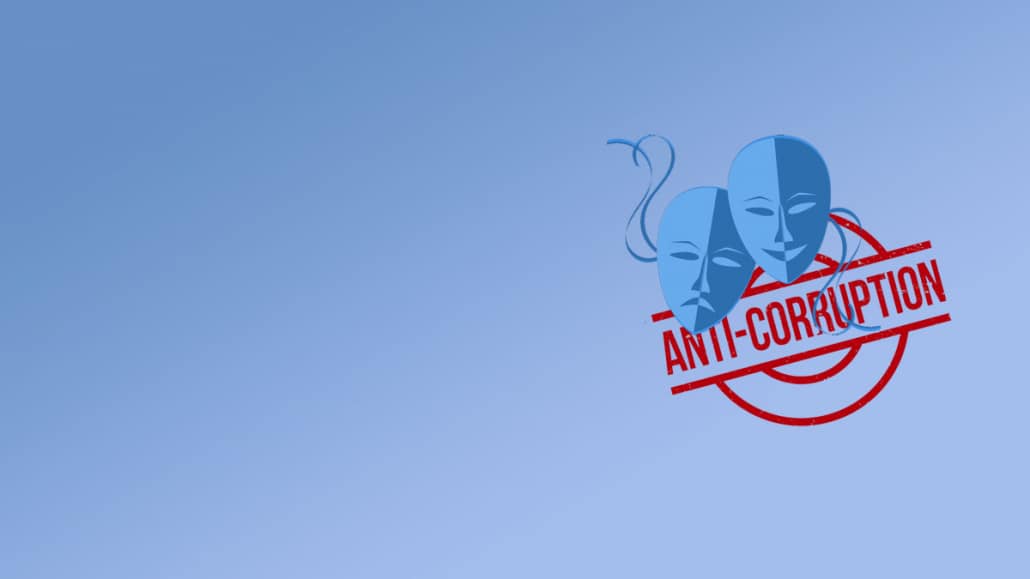By Brooke Davies
First posted on the Glocal Anticorruption Blog
Corruption is a serious matter—it sucks away public finances, undermines good governance, ends livelihoods, and consumes lives. It’s therefore understandable that many anti-corruption activists centre much of their work on getting people to take corruption seriously. But despite the underlying gravity of the problem, sometimes a surprisingly effective way to fight against corruption is to make people laugh about it.
Consider Alexei Navalny, the Russian activist whose attempted assassination, arrest, and imprisonment underscore just how much Moscow has recognised his power. One of the striking things about the explosive videos that Navalny has released to expose the Putin regime’s corruption is that the videos aren’t just shocking—they’re funny. People enjoy watching them because of their biting humour—and while they’re laughing, they also learn about Putin’s siphoning of public funds for his own benefit.
There are plenty of other examples of anti-corruption activists effectively using humour as part of their campaigns. To mention just a few:
- Last summer, Lebanese activists staged a fake—and deliberately comical—“funeral” for the Lebanese currency (the lira), as a protest against the cronyism and mismanagement that “killed” the Lebanese lira and tanked the country’s economy. A video of the “funeral” gathered over 10,600 views on Twitter and brought renewed international attention to an anti-corruption protest movement that at that point was approaching its seventh month without much success.
- A Chinese artist known as Badiucao has used satirical art to bring attention to the ruling party’s political corruption, including a famous “promotional poster” for the TV series House of Cards, with Xi Jinping sitting on the throne instead of series villain Frank Underwood. His art helped spark renewed criticism of the regime and is credited with inspiring political cartoons throughout Hong Kong’s democratic uprising against China’s controversial 2019 extradition bill.
- In Ukraine, Volodymyr Zelensky was elevated from comedian to President of Ukraine by campaigning on an anti-corruption platform. Comedy was a key part of his 2018 campaign—instead of traditional rallies, he held performances by comedy troupes skewering the corruption of the incumbent regime.
- Back in 2004, the then-mayor of Bogota Antanas Mockus pushed back against the city’s petty corruption through antics like inducting 150 “honest” taxi drivers into a fictional club called the “Knights of the Zebra.”
These and other examples illustrate an important lesson for anti-corruption activists: Notwithstanding the seriousness of corruption and the harm that it causes, humour can be a powerful tool in spreading an anti-corruption message. As a rhetorical device, humour has a few distinctive strengths:
- First, humour helps upend the narratives of unshakeable power that corrupt officials depend on to remain in office. Laughter, according to a classic theory, can devalue the subject of the humour—as Egyptian comedian Bassem Youssef once put it, “You can’t really respect or fear something you are laughing at.” (The American activist Saul Alinsky, one of the grandfathers of community organising, once similarly remarked that “the most potent weapons known to mankind are satire and ridicule.”) Making fun of corrupt officials is a way to tell them, “We know what you’re doing, and we know you’re not invincible.”
- Second, humour helps spread an anti-corruption message more effectively. As noted above, Navalny’s videos are effective in large part because people enjoy watching them and like sharing them. Navalny and other activists who rely on humour know instinctively what the research also shows: funny content spreads faster and farther. Humour, in short, is often more likely to go viral.
- Third, humour helps sustain protests. Fighting corruption can be draining and dispiriting. Maintaining a mass movement against corruption is hard. The use of humour—adding some fun and levity to this serious and sometimes dangerous enterprise—can both lessen the burden of prolonged protest and increase participation from those who might otherwise feel too daunted to turn out. As one Lebanese activist involved in using comedy shows and picnics as part of a protest strategy explained, “if you’re serious about everything all the time you’re going to get emotionally drained.” Or as Gandhi once quipped, “If I had no sense of humour, I should long ago have committed suicide.”
- Fourth, government attempts to match or suppress humour often backfire. Consider Chinese blogger Fang Hong, who in 2012 published a joke mocking CCP leader Bo Xilai’s connections to organised crime. For the post, Fang Hong was sentenced to a year in a prison camp. However, the crackdown only ensured that his sentence, his subsequent lawsuit against Bo, and most importantly the rumours about Bo’s wrongdoing, got international press coverage, and ultimately contributed to Bo’s downfall. The Chinese regime’s impulse to squash Fang’s joke points to a general rule of humour and activism: attempts to suppress humour often only draw more attention to it. As such, activists deploying humorous tactics against corrupt officials may gain more from the regime’s reaction than from the initial joke.
Of course, using humour as an anti-corruption tactic has potential downsides. Treating a serious subject with humour can risk trivialising the issue. Sometimes making jokes about injustice contributes to a sense of resigned acceptance or cynical complacency rather than outrage; the jokes may relieve pressure that might otherwise have been directed toward mobilising for systemic change.
But these risks, though real, are more likely the result of misusing humour as a tactic, or using the wrong kind of humour, rather than deploying humour in a way that amplifies and sustains a disruptive anti-corruption message. If used appropriately, humour has a unique power to drive home the injustices and absurdities of a corrupt system in a way that is easier for activists to spread and harder for governments to counter.
Activists and reformers should continue their efforts to make people take corruption more seriously—but, perhaps ironically, sometimes one of the best ways to do so is to make people laugh at it.

